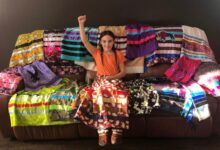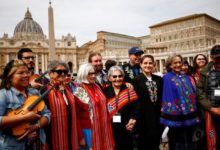Meet 5 Indigenous youth who are spreading hope in communities on World Suicide Prevention Day
Sept. 10 marks World Suicide Prevention Day. It’s an important day for Indigenous youth involved with We Matter, an Indigenous youth-led non-profit organization founded by Dene/Métis siblings Kelvin and Tunchai Redvers in 2016.
The organization has over 30 First Nations, Métis, and Inuit youth who were trained in self-care, public speaking, mental health training and workshop facilitation so they can return to their regions to support their peers directly as Ambassadors for Hope.
Meet five who are making a difference in their communities when it comes to suicide prevention and mental health.
1. Chyler Sewell
Chyler Sewell, 17, is Anishinaabe from the Garden River First Nation near Sault Ste. Marie, Ont., and is in her last year of high school in Hamilton. She is working on starting a support group for urban Indigenous youth in the city.
“Indigenous people living on the rez are experiencing a lot of the same trauma but can find shared healing. However in urban settings, people often find themselves isolated and they can’t get that shared healing and are forced to share these traumas on their own,” said Sewell.
“When we have have a space to gather as urban Indigenous youth, then we can share our traumas and share healing.”
She is currently waiting on approval of a grant to fund the project.
2. John Peters
Twenty-five-year-old John Peters lives in Gilliam, Man., and is a member of the Fox Lake Cree First Nation.
He organized his community’s first Pride celebration in June and helps facilitate Proud Spirits of the North, a 2SLGBTQ support group.
“There was a need for a larger acknowledgement that we have members in our community that identity in these ways and that needs to be seen. They need to be heard, and need to have space,” said Peters.
Peters plans to start a session in the future where community members can pop by to learn, share, and take about mental health over a cup of coffee.
“I struggle with anxiety, and I didn’t even know what anxiety was until I was 22. Knowing now what I know, that’s crazy. Information on mental health should be taught as early as kindergarten,” said Peters.
3. Jenna Robar
Jenna Robar, 23, is Mi’kmaw from Cape Breton, N.S., and has been living in Toronto for the past five years. She currently works for the YMCA, speaking with newcomer youth in the Greater Toronto Area about Indigenous life and culture in Canada.
On Sept. 10, she’ll be speaking about reconciliation with the organization’s youth leaders, and plans on incorporating her training as an Ambassador of Hope to emphasize the importance of balance when it comes to mental health.
“Balance being culture, food, community, connecting with nature. These are things we don’t exactly think about when it comes to mental health or mental illness,” she said.
In the future, Robar hopes to organize a tour of Indigenous communities in the Maritimes to speak about life promotion.
4. Nigel Adams
“It feels like you are alone. I went through this myself, and it’s a really dark place when you have to deal with this on your own and you’re afraid of speaking up,” said Adams.
“I did want to end my life before because I had no hope and felt like I was the only person struggling, and felt like I had no one to turn to. It’s not until I started to open up to people who understood and are there for me.”
5. Danika Vessel
As an Ambassador for Hope, she’s working with an elder to launch a local support group for Indigenous youth to have access to cultural activities. It’s something she feels is an important part of mental health and suicide prevention.
“Practising culture, having that support, being a part of a group where you can meet for ceremony are really important to life promotion. It gives you hope,” said Vessel.
“Our elders and healers are our first psychologists, so it’s really important to bear that in mind in psychology and connect with those different cultural opportunities that can help us with our mental health.”








Redes Sociais - Comentários